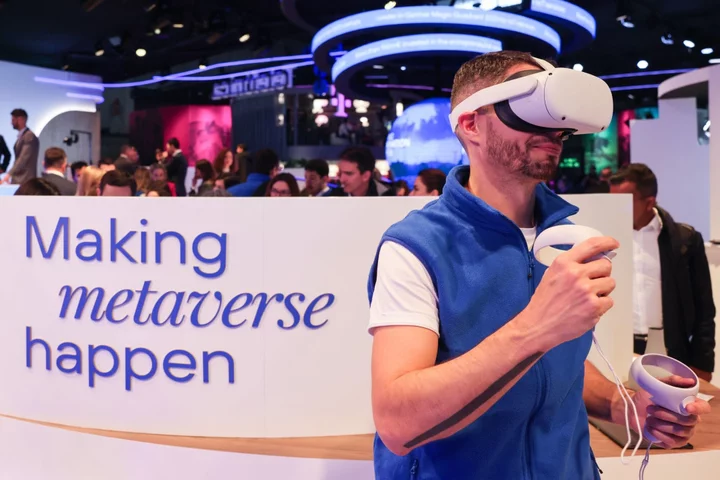Meta Platforms Inc. is hoping to revive interest in the metaverse by pitching it as a tool to help train workforces, showing the social media giant isn’t backing down on its virtual reality ambitions even as artificial intelligence takes center stage.
Nick Clegg, president of global affairs, touted the “transformative” role augmented and virtual reality can play in job training and education, speaking at the company’s “Future of Work Summit” in Washington on Tuesday. The event was hosted by companies like Interplay Learning, Talespin and Embodied Labs.
“I certainly believe when it comes to AR and VR, it’s very obvious to me that one of the most powerful applications is the ability to dramatically improve re-skilling,” Clegg said pointing to applications in skilled trades as well as schools and elder care.
Clegg sounded optimistic despite fading enthusiasm around the metaverse and recent job cuts at Reality Labs — the Meta division that produces the Quest VR headset and the Horizon Worlds VR platform. Clegg said it would be “about 10 to 15 years before the technology is sufficiently mature and affordable and accessible to really have the same kind of prevalence in society.”
Doug Donavon, chief executive officer of Interplay Learning, which uses Meta’s VR headsets to train workers in trades like plumbing, HVAC systems and electrical services, said the technology has helped create a “boot camp style” training that gets people prepared for jobs in five to six weeks versus several months. While there’s more commitment by employers in these industries to use VR, adopting the technology remains a hurdle. “There’s not full buy-in,” Donovan said at the event. “It’s a hand-to-hand battle to convince them there’s potential.”
Recent advancements in artificial intelligence and specifically the generative AI behind the popular chatbot ChatGPT, have captivated the tech world, sprouting new startups. Clegg said the changing hype cycle is helping the company’s metaverse goals, not replacing them. “We can do both. It’s not a tradeoff,” he said.
“One entirely reinforces the other. It’s impossible to imagine people enjoying the metaverse in the future without generative AI,” Clegg added, giving an example about shortening the time to build a virtual world by using a simple verbal prompt.
The rise of artificial intelligence has also renewed fears about people’s jobs being replaced. For Meta, those concerns present an opportunity to position the technology as a way to put more people in jobs, not displace them, Clegg said.
That selling point has already garnered some support on Capitol Hill. Last week, US House Representatives Lisa Blunt Rochester, a democrat from Delaware, and Tim Walberg, a republican from Michigan introduced the Immersive Technology for the American Workforce Act, a bipartisan bill that creates a five-year grant program at the Department of Labor to support community colleges and career education centers in deploying augmented and virtual reality in classrooms.
Beyond the loss of jobs, AI is also prompting ethical, legal and national security concerns about what the technology can do. Even Sam Altman, the creator of ChatGPT, called on US Senators on Tuesday to more heavily regulate AI technologies, warning that it’s powerful enough to change society in unpredictable ways.
Clegg said Meta has had “numerous conversations” about what regulating the metaverse would look like and welcomes guardrails. “I think one thing we’ve all learned over the last decade and a half is that it’s not great when you have technology erupt and then you have retrospective legislation,” Clegg said, adding that AI is a more pressing challenge with regulators at the moment. “The good thing about the AR/VR technology is that we have time. We don’t need to do this in a mad rush,” he said.









